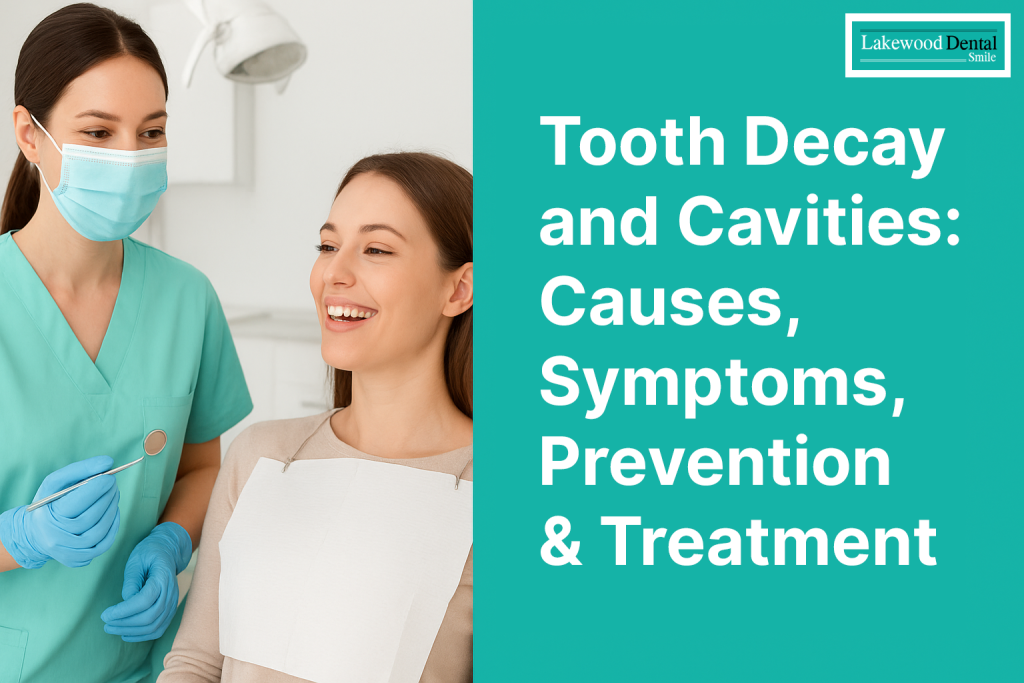Tooth decay is one of the most common dental problems worldwide — and it’s not something to ignore. Millions of people each year need dental treatment or even hospitalization due to severe decay. One of the main causes is neglecting essential oral hygiene practices. In this article, we’ll explore what causes tooth decay, how to recognize the symptoms, ways to prevent it, and the treatments available to restore your smile.

What Causes Tooth Decay?
The primary cause of tooth decay is the interaction between the food we consume and the bacteria that naturally live in our mouths. Plaque—a sticky film that builds up on teeth—provides the perfect environment for bacteria. When these bacteria feed on sugars and starches, they release acids that gradually wear away the enamel, the protective outer layer of teeth.
Over time, this process leads to cavities. If untreated, these cavities can grow deeper, eventually affecting the dentin (the inner tooth layer) and pulp (nerve tissue).
Mini-case example: Imagine a teenager who drinks soda daily but doesn’t brush regularly. The sugars in soda feed harmful bacteria, producing acid that weakens enamel. Within months, small cavities appear, which, if ignored, could progress to painful infections.
What Are the Symptoms of Tooth Decay?
Recognizing the signs early can help prevent serious dental issues. Common symptoms of tooth decay include:
- Toothache or sensitivity when eating hot, cold, or sweet foods
- Swollen or bleeding gums
- Persistent bad breath or a foul taste in the mouth
- White, brown, gray, or black spots on teeth
Practical tip: Even mild tooth sensitivity should not be ignored. A quick dental checkup may reveal early decay that can be reversed before a cavity forms.
How to Prevent Tooth Decay
The good news is that tooth decay is largely preventable with consistent care and healthy choices.
1. Daily Oral Hygiene
- Brush your teeth twice daily with fluoride toothpaste.
- Floss once a day to remove plaque and trapped food between teeth.
2. Smart Eating Habits
- Limit sugary foods and drinks such as sodas, sweets, and sticky snacks (like caramel or raisins).
- Avoid late-night snacking — food particles left overnight are a feast for bacteria.
- Drink water frequently to wash away food residue and neutralize acids.
Professional Care
- Visit your dentist at least once or twice a year. Professional cleanings and checkups can detect problems early.
- Ask about dental sealants for children. These thin coatings protect molars from decay.
Lifestyle implication: A balanced diet not only benefits your teeth but also supports overall health. Cutting down on sugar reduces risks of obesity and diabetes alongside cavity prevention.
How Is Tooth Decay Treated?
Treatment depends on the severity of the decay. Dentists may recommend:
- Fluoride Treatments – In early stages, fluoride can help remineralize enamel and stop decay from progressing.
- Dental Fillings – When a cavity forms, the decayed part is removed and replaced with filling material.
- Dental Crowns – For severe cases, a crown covers the damaged tooth, restoring strength and function.
- Root Canal Therapy – If decay reaches the pulp, the infection is removed while saving the natural tooth.
- Tooth Extraction – In extreme cases, a severely damaged tooth may be removed and replaced with a dental implant or bridge.
Comparison example: A filling is like patching a small hole in a wall, while a crown is like covering a large crack with a strong shield. Root canal therapy, on the other hand, is like repairing the wiring inside the wall instead of replacing the entire structure.
Professional Dental Care in Dearborn, MI
Lakewood Dental Smile in Dearborn, Michigan, provides expert care in a welcoming environment. If you are experiencing tooth decay or any other dental concerns, their skilled team can diagnose issues and recommend effective treatments to restore your smile.
Final Thoughts
Tooth decay is preventable and treatable if you take the right steps. By understanding its causes, spotting symptoms early, practicing good oral care habits, and visiting your dentist regularly, you can protect your teeth for years to come.
Healthy teeth don’t just improve your smile — they enhance confidence, speech, and overall well-being. Prevention is always easier and less costly than treatment, making daily care the best long-term investment in your oral health.


